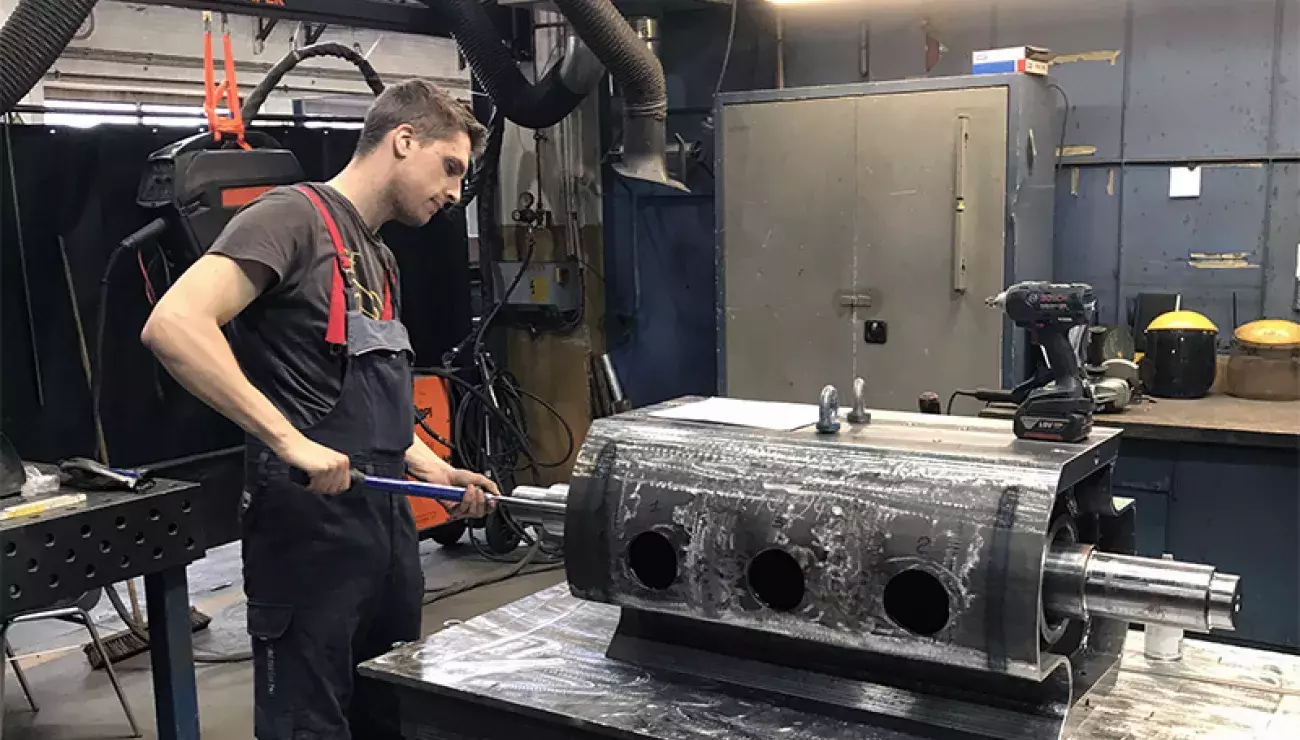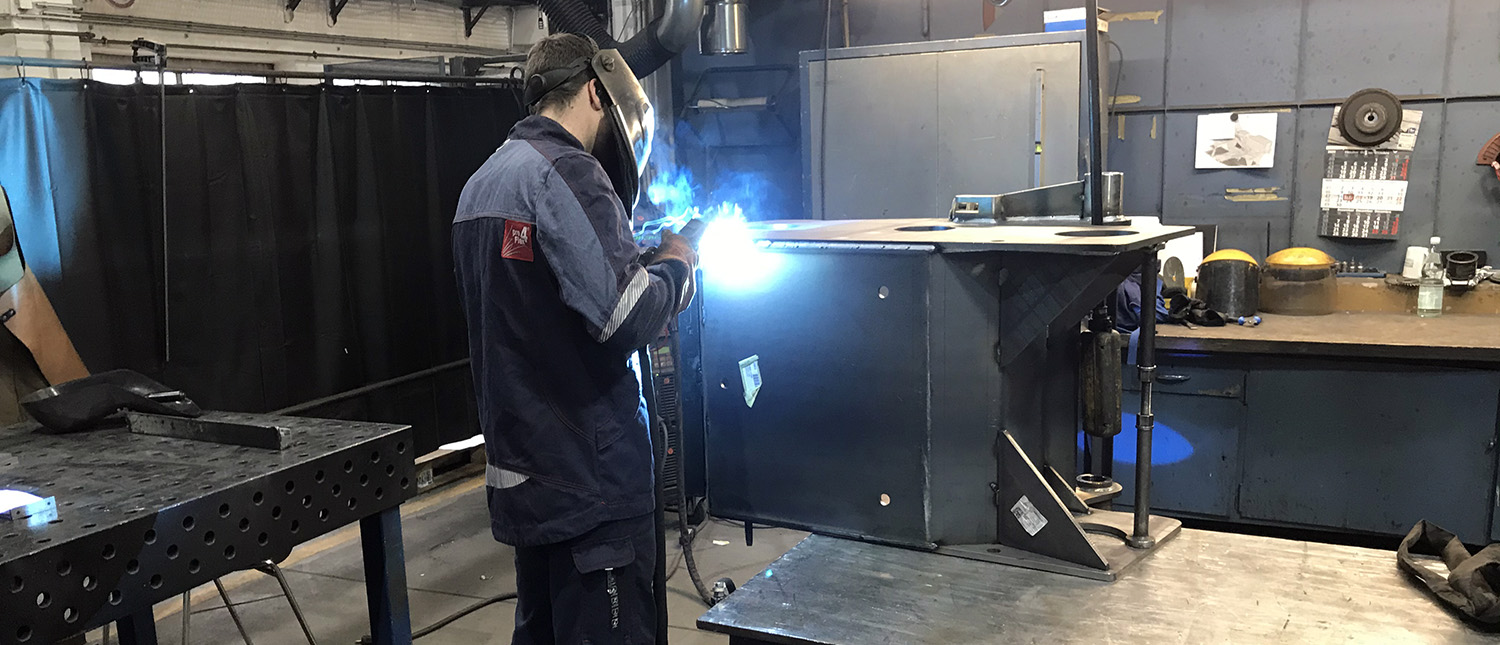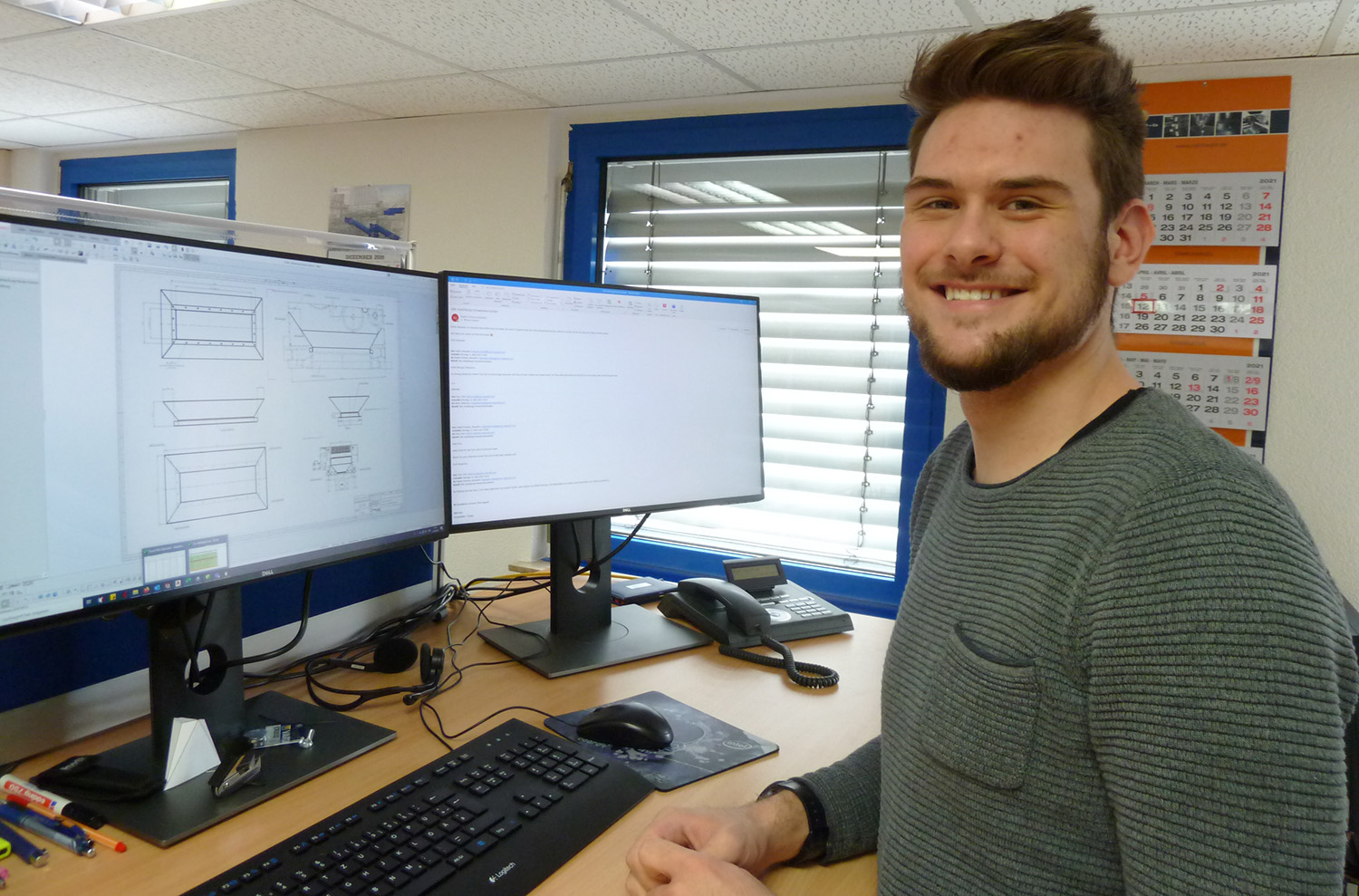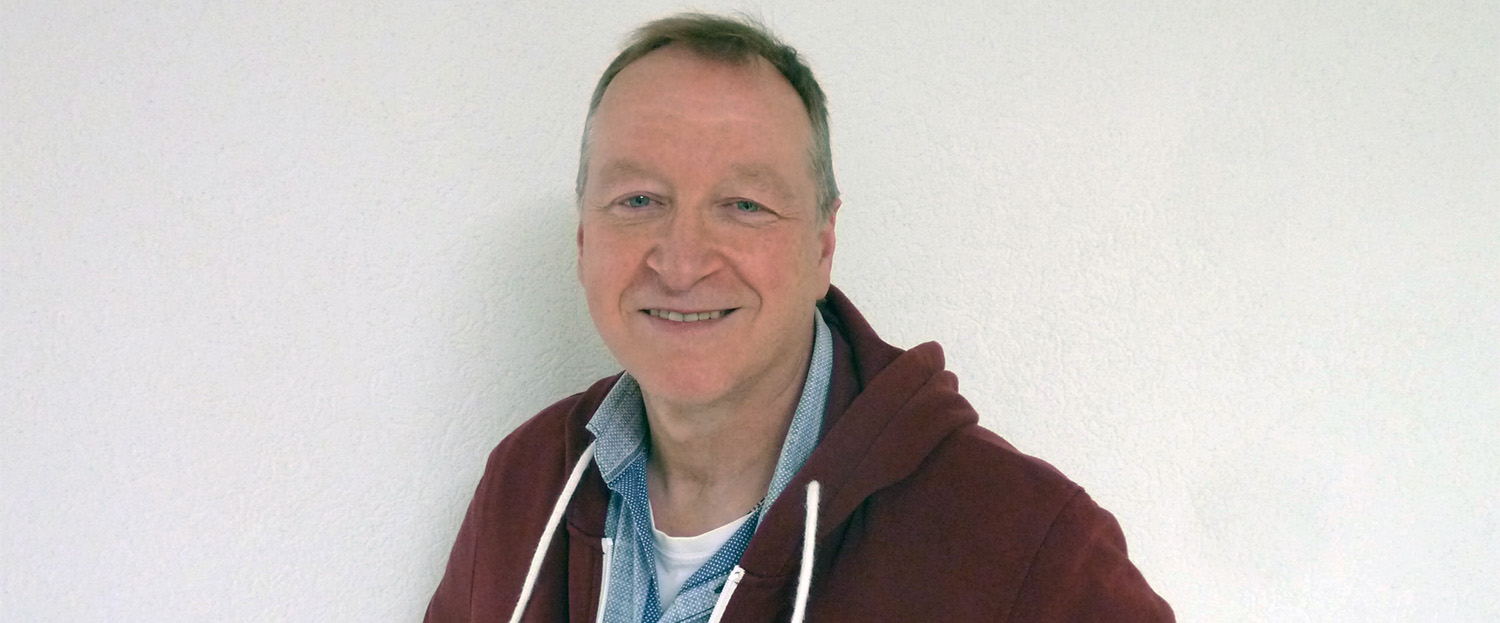
Apprenticeships: passing on expertise, training our next generation
19 Apr 2021While Bruks Siwertell understands that there can be no substitute for experience, expert industry knowledge is no use if it cannot be passed on to new people. One of the many ways that we undertake the transfer of expert knowledge, and the continuation of a competent, skilled workforce, is through our apprenticeship schemes.
These are run in various capacities throughout the organization, but the apprenticeships offered by Bruks Siwertell company, Bruks Klöckner GmbH, based in Hirtscheid, Germany, are a great example.
“The aim of vocational training is to impart the necessary skills and qualifications for performing a qualified job in a changing world of work, and provide an early grounding in professional experience,” says Dirk Horz, Technical Department, and the person responsible for apprenticeships at Bruks Klöckner GmbH.
Maintaining a skilled workforce
“In Germany, apprenticeship schemes, which offer young people professional qualifications upon their completion, are essential pillars for both trainees and companies. They meet the need for businesses to obtain skilled workers, trained to their specific needs, so that they can guarantee efficient and competent staff, and it is a model that benefits trainees as well.
“Young people frequently choose this path as an entry into a qualified job or employment after school, and the low youth unemployment rates in Germany, compared with other European countries, offers evidence of this special labor market and its educational relevance,” notes Horz.
Apprenticeships are part of Germany’s dual educational system, named as such because learning takes place at two locations: one within the company and the second within a vocational school.
The duration of vocational training, within this dual system, varies between two and three and a half years, depending on the chosen profession.
Open to everyone
“There are no formal entry requirements for access; essentially, training in the dual system is open to everyone,” he says “The majority of trainees, however, have a secondary school leaving certificate or even a university entrance qualification when they start their training.
“Our apprenticeship schemes are all certified. The training that Bruks Siwertell offers, at Bruks Klöckner for example, takes place according to the specifications of the German Conference of Ministers of Education in the dual system. The entire training period is divided into company and job-related training. Trainees take part in professional school classes for one or two days a week and the remaining time is spent learning within our different departments,” explains Horz.
Bruks Klöckner GmbH currently offer apprenticeships for the professions of precision mechanic (HWK) and technical product designer (IHK). Both last for three and a half years and are either completed with a final exam at the Chamber of Crafts (HWK) or the Chamber of Commerce and Industry (IHK).
Internships offer valuable insight
“Before starting any apprenticeship in Hirtscheid, we offer the possibility of a two-week internship in the corresponding department. This enables our trainees to evaluate if this job will be the right job for them,” he highlights.
To give an overview, precision mechanic apprentices are trained on turning, milling and computer numerical control (CNC) machining centers, along with the potential for additional external courses in, for example, pneumatics and hydraulics.
In the final assembly area, trainees learn all the manual skills, such as welding, drilling and assembling components, which are required to manufacture Bruks Siwertell products. Apprentices are able to plan and organize their work and determine the work processes independently. Over the duration of the course, they will then be able to manufacture machines themselves according to given specifications. Depending on the level of training, apprentices also take part in on-site customer projects.
Apprentices for technical product designers are trained on the 3D software SolidWorks from the beginning. They start with small projects and over the course, they are enabled to process orders independently. They work in direct contact with the project department and customers, so that they develop the skills to implement solutions. All trainees take part in company projects, product assembly and final machinery production. Then they present and evaluate the results.
Opportunities beyond training
“Our approach to training means that apprentices obtain all the basics, but also deep, embedded technical and manual knowledge of the necessary procedures and production techniques so that they can draw upon this later in the job,” Horz says. “Furthermore, after completing apprenticeship training, we offer the opportunity to continue learning at even greater depths and become a master mechanical engineer or engineer. Feedback from apprentices is extremely important, as it shapes future training.”
The voices of our latest recruits
Currently, two young employees have successfully finished their apprenticeships and have been taken on in permanent positions.
David Lück has recently completed his apprenticeship as a precision mechanic, specializing in mechanical engineering.
“My father has been with Bruks Klöckner since his apprenticeship, so I have known the company since I was a child,” says Lück. “I have always enjoyed manual work and I decided to do an internship with the company and after this got my contract and started the apprenticeship.
“During my three and a half year apprenticeship, I have learned basic manual skills and quickly got involved in mechanical engineering. I experienced roles in several departments, such as the mechanical workshop, warehousing and final assembly,” he continues. “I also attended various inter-company courses including the basics of metal processing, machining and machine tools, control technology, programming and working on CNC numerical machine equipment at the Koblenz Chamber of Crafts (Handwerkskammer). The theoretical part was taught at the vocational school.”
Lück’s training content included working on machine tools, setting up and testing hydraulic and pneumatic controls, assembling and commissioning machine assemblies, and maintaining technical systems.
“In addition to my work within the company, I was given the opportunity to assemble machines and complete systems at the customer’s site and carry out maintenance work. After completing my apprenticeship, I successfully passed my final exam and continued to work for the company through a transfer agreement. I am very happy about this,” concludes Lück.

Sebastian Kexel has also recently finished his apprenticeship as a technical product designer in the technical department. “I got to know Bruks Klöckner GmbH at a job information event in my school and did an internship as a technical product designer,” he says. “I really enjoyed it. All the employees were very friendly and helpful, and I was able to gain some insights into the company and the profession.
“After a second internship, this time as a precision mechanic, I was sure that Bruks Klöckner GmbH was the company that I wanted to work with for my professional formation,” Kexel says. “So, after graduating from secondary school, I started my apprenticeship as a technical product designer, specializing in machine and system construction.”
The content of this apprenticeship focused on machine design, defining its technical data, such as engine performance, machine and component dimensions. All basic theoretical knowledge was taught in the vocational school.
“A very important part of this apprenticeship is the use of a computer-aided design (CAD) program, so that we are able to design 3D-machine components with their corresponding drawings,” he notes.
“I started production drawings almost straight away, and after checking my design with my instructor, the parts were built in the workshop. So, I was very proud that one of my first ‘real’ projects was a complete vibratory feeder, which has been successfully realized according to my plans.
“In addition to this, I had the opportunity to work in project planning and project management. This was a very important experience, as I learnt how essential the exchange with customers is, to gather all the necessary information and avoid problems down the line,” highlights Kexel.
Another field of work completed during his course was the design of spare parts, which revealed how Bruks Siwertell engineers have to overcome the challenge of new designs having to be adapted to existing machines.
“I remember one big challenge was the creation of a new rotor for an older drum chipper. During this task, I had the chance to visit the customer, which helped me to understand the relationships between our individual components and the complete system,” he says.
“Another significant part of my training was working on projects together with the workshop, as I was able to create a connection between my designs and their production in practice. I helped to assemble machines and learned a lot about defining the shape of components in my designs.
“For my last exam, I completed a final project that covered all the skills I had learnt. I passed with very good results and since then have continued to work for the company,” Kexel concludes.


Dirk Horz, Technical Department, and person responsible for apprenticeships at Bruks Klöckner GmbH.
 Bruks-Siwertell
Bruks-Siwertell